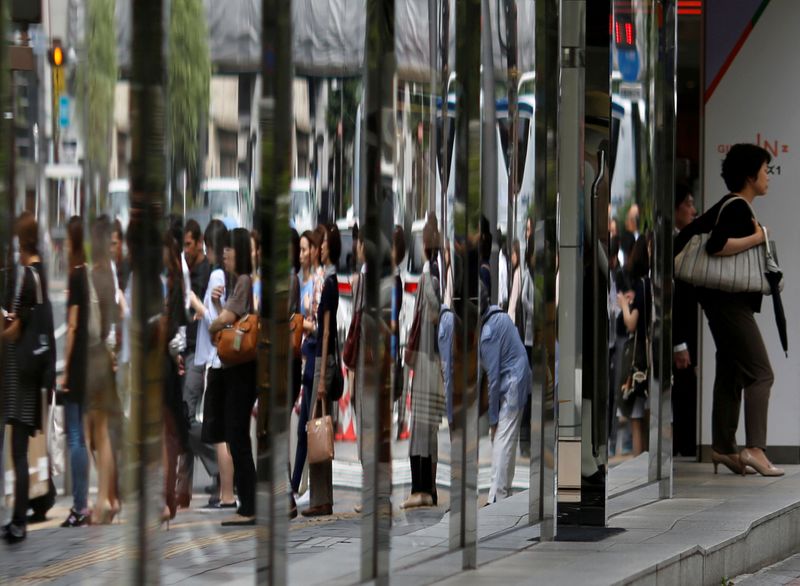By Kantaro Komiya
TOKYO (Reuters) -Japan's household spending fell more sharply than expected in August, as state of emergency curbs to combat the coronavirus pandemic weighed on consumption during the summer holiday season and risked undercutting the economy's recovery.
Friday's government data bodes ill for new Prime Minister Fumio Kishida's efforts to revitalise the pandemic-hit economy and distribute more wealth to households through higher wages.
The 3.0% year-on-year decrease in spending was worse than a median market forecast for a 1.5% drop and followed a 0.7% increase in July.
The month-on-month figures showed a 3.9% contraction in August, the fourth straight month of decline, and compared with expectations for a 2.0% drop.
The spread of the COVID-19 infections and subsequent restrictions nationwide hindered consumption in restaurant dine-ins and a wide variety of goods from fashion items to furniture, a government official said, adding that rainy weather also discouraged customers' visit to stores.
"What's more, supply chain issues have started to affect private consumption, as car sales have been declining since August; it was worse in September," said Takumi Tsunoda, senior economist at Shinkin Central Bank Research Institute, referring to statistics by the automobile industry.
"Service spending will bounce back in September as infections waned and more people are active outside, but the large dip in car sales may strip the momentum for recovery," Tsunoda said, adding sales of consumer electronics like smartphones may also be affected by the supply chain disruptions.
Consumption has been a weak spot for the world's third largest economy as a spike in Delta variant cases and state of emergency curbs kept households from shopping or eating out. Japan's services sector activity shrank for a 20th straight month in September, according to a recent private survey.
But analysts expect consumption to rebound in coming months as the lifting of curbs from October and steady progress in vaccinations heighten hopes of pent-up demand.
The economy, however, faces fresh headwinds from supply constraints, as a shortage of semiconductor chips and parts disrupts automobile production enough to hurt exports.
Following annualised growth of 1.9% in the second quarter, analysts predict a slowdown in July-September largely due to weaker private consumption.
Separate data on Friday showed inflation-adjusted real wages in August rose 0.2% from the same month a year earlier, largely due to a statistical base effect.
Wages "should rise higher over the coming months as the labour market tightens and vaccines allow a full recovery in overtime and bonus payments," said Tom Learmouth, Japan Economist at Capital Economics.
Other government data issued on Friday showed an index of service sector sentiment gained 7.4 points to 42.1 in September, recovering from a double-digit drop the previous month as COVID-19 infections fell nationwide and vaccinations rose.

The index is based on a survey of "economy watchers" consisting of workers from taxi drivers to hotel and restaurant staff.
The watchers' outlook index also jumped 12.9 points to 56.6, its highest since November 2013, as people saw a clearer path to the post-pandemic economy.